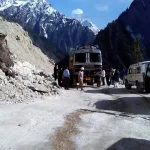Terrorism has emerged as the worst threat to humanity that transcends the international borders. It has led to new challenges that have changed the security dynamics and the strategic thinking. As we have entered an era of asymmetrical warfare where the conventional mechanisms have proved ineffective to deal with the terrorist threats. In Jammu and Kashmir too there has been a gradual shift from the conventional terrorist activities. Though the fundamentals of the terrorist machinations are same everywhere that is to destabilise the society and infuse a sense of fear psychosis among the masses. As it enables the terror modules to implement their writ. After all terrorism flourishes through fear and loss of faith in law and order. The first casualty of terrorism is the disruption of law and order. Subversion is the most vicious tool used by the terror cartels to destroy the economy and social fabric with an emphasis to sow seeds of division in the society in the name of religion and ideology. Vicious cycle of terrorism has come a long way and this evil business too has been influenced by digital technology making it more complex. The indoctrination of the human resources and the money required for the terror acts are being outsourced and managed through digital platforms. In Jammu and Kashmir there has been a spike in a new form of terrorism called hybrid terrorism that is being guided by social media platforms having command and control in the places outside the Indian Territory. The security forces are well equipped to deal with the worst and challenging conditions on the borders and at ground zero to maintain peace but the situation becomes murky when the digital technology makes the terror modules breach the security net. It is due to these new challenges to national security that there is an urgent need to develop new strategies to make the nation terror free. While addressing the Anti-Terror Conference in New Delhi, Union Home Minister Amit Shah has revealed the Centre’s planning to introduce a new counter-terrorism policy and strategy to fight the national security threats, terrorists and their ecosystem. He reaffirmed the Modi government’s resolve to create a strong ecosystem against terrorism. He has underlined that though the law and order is a state subject besides the states have the geographical boundaries and constitutional limits but terrorism has no boundaries. His rationale was clear that all security agencies that include both at the state and the central level must work in tandem to devise joint strategies and share intelligence to eliminate terrorism. The Union Home Minister also revealed that the Centre has a vision for a model Anti-Terrorism and Squad(ATS) and model Special Task Force(STF) meant to deal with terrorism in all states and union territories. It will help to develop a one platform to control terrorism. Underlining the need for the state and centre co-ordination to fight the evil of terrorism and safeguard the territorial integrity and sovereignty of the nation, he emphasised that “we need to work together to fight terrorism, terrorists and their ecosystem. And that’s why; we will soon bring a new national counter-terrorism policy and strategy in which you all will play a key role.” Linking the new counter policy with Prime Minister Narendra Modi’s vision of Developed India by 2047 he said that everyone has to deal with all security challenges and have a unified ecosystem to defeat terrorism. Indeed the new challenges posed by terrorism to India in the times when the asymmetrical warfare is used by the nation’s like Pakistan to balkanise India; new counter terror policy is the need of the hour.
New Counter Terror Policy

Sign Up For Daily Newsletter
Be keep up! Get the latest breaking news delivered straight to your inbox.
By signing up, you agree to our Terms of Use and acknowledge the data practices in our Privacy Policy. You may unsubscribe at any time.
Leave a Comment Leave a Comment
Stay Connected
Latest News
Recent Posts
- History Lives On: Kashmir’s lost kingdoms resurface through Akul Tripathi’s lens
- Relief on a Fragile Road: Jammu-Kashmir’s Highway Battles Back
- J&K Senior Softball Teams Selected for 15th Federation Cup
- Singpora Kalan Hosts U-19 Cricket Selection Trials
- Rugby Fever Grips Kashmir: 7s Championship ends on High Note in Sgr







